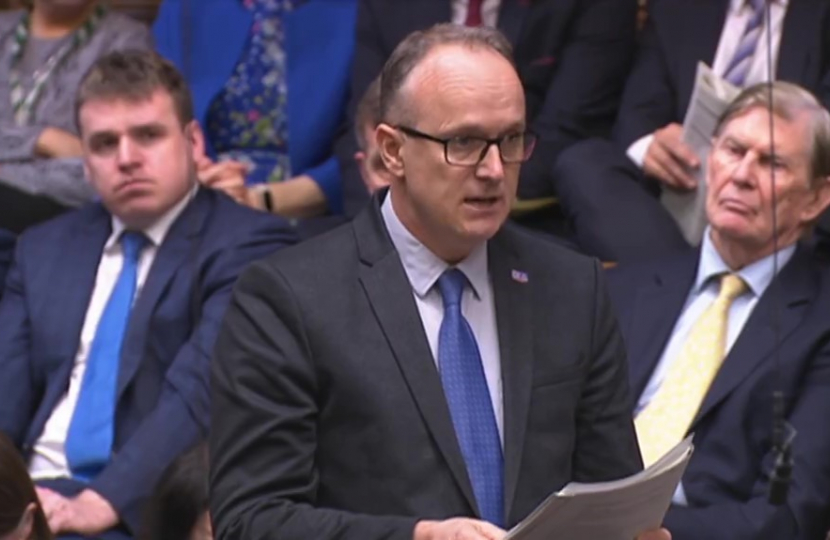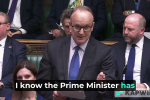
Having spearheaded Parliament’s response to the alarming rise in youth vaping, Dr Neil Hudson is celebrating the Prime Minister’s decision to ban disposable vapes, drastically restrict marketing that appeals to young people and stop displays in children’s eyelines.
Dr Hudson secured and led a key parliamentary debate on keeping children safe from the dangers of vaping in May 2023; consistently raised the issue in the Commons throughout last year; penned articles on the significance of banning disposable vapes; tabled parliamentary questions and met with a range of stakeholders from local teachers to the Advertising Standards Authority.
Recent figures show the number of children using vapes in the past three years has tripled. Use among younger children is also rising, with 9% of 11 to 15-year-olds now using vapes. The long-term health impacts of vaping are not fully understood and the nicotine contained within them can be highly addictive, with withdrawal sometimes causing anxiety, trouble concentrating and headaches.
Dr Neil Hudson MP heard from educators how some children are setting alarms in the middle of the night to vape, and thus stave off withdrawal symptoms when they wake up. From disrupting their education to causing behavioural issues, teachers and parents have contacted Dr Hudson about their significant concerns regarding vapes.
In response, Government this week announced new powers to restrict flavours that appeal to children, ensure manufacturers producers plainer packaging, and restrict how vapes are displayed in shops moving them out of children’s eyelines and away from products such as sweets.
To crack down on underage sales, Government will also bring in new fines for shops in England and Wales which sell vapes illegally to children. Trading standards officers will be empowered to act ‘on the spot’ to tackle underage tobacco and vape sales. This builds on a maximum £2,500 fine that local authorities can already impose.
Vaping alternatives – such as nicotine pouches – will also be outlawed for children who are increasingly turning to these highly addictive substitutes.
Dr Neil Hudson MP said:
“Having tirelessly steered Government policy from the Commons over a long period, I am delighted the Prime Minister and Government have listened and accepted the evidence that disposable vapes - with their bright colours and sweet flavours - are sparking this alarming rise in youth vaping. Impacting children's education, damaging their bodies and even impacting their mental health, the case is clear that no child should ever pick up a vape. These new measures provide progressive and robust action to resolve the problem.
"Moreover from lithium wastage to causing fires, to littering our town centres and harming wildlife and pets - the environmental benefits of the ban will be huge.
"This announcement is the culmination of huge efforts from MPs, Ministers, charities, teachers, parents and NGOs. I thank everyone who has shared my vision to protect our children and worked so hard to make it a reality."
Disposable vapes have been a key driver behind the alarming rise in youth vaping, with the proportion of 11 to 17-year-old vapers using disposables increasing almost ninefold in the last two years.
Dr Hudson has been resolute that while vaping can play a role in helping adult tobacco smokers to quit, children should never vape.
This dovetails with Government’s commitment to bring about the first smokefree generation by introducing legislation so children turning fifteen this year or younger can never be legally sold tobacco.
Smoking is the UK’s single biggest preventable killer – causing around one in four cancer deaths and leading to 80,000 deaths per year – so stopping young people from ever starting to smoke will protect an entire generation, and future generations, from smoking harms as they grow up.
To help ensure the success of the smokefree generation plan, £30 million new funding a year will be provided to bolster enforcement agencies – including Border Force, HM Revenue and Customs (HMRC) and Trading Standards – to implement these measures and stamp out opportunities for criminals.
The Prime Minister, Rishi Sunak, said:
“As any parent or teacher knows, one of the most worrying trends at the moment is the rise in vaping among children, and so we must act before it becomes endemic.
“The long-term impacts of vaping are unknown and the nicotine within them can be highly addictive, so while vaping can be a useful tool to help smokers quit, marketing vapes to children is not acceptable.
“As Prime Minister I have an obligation to do what I think is the right thing for our country in the long term. That is why I am taking bold action to ban disposable vapes – which have driven the rise in youth vaping – and bring forward new powers to restrict vape flavours, introduce plain packaging and change how vapes are displayed in shops.
“Alongside our commitment to stop children who turn 15 this year or younger from ever legally being sold cigarettes, these changes will leave a lasting legacy by protecting our children’s health for the long term.”
Health and Social Care Secretary Victoria Atkins added:
“Smoking is still the single largest preventable cause of death in England. Almost every minute of every day someone is admitted to hospital with a smoking-related disease. And its costs society £17 billion each year – putting a huge burden on our NHS.
“That’s why we are driving the way forward through our smokefree generation plan, which will prevent our children from starting this dangerous habit.
“The health advice is clear, vapes should only ever be used as a tool to quit smoking. But we are committed to doing more to protect our children from illicit underage vaping, and by banning disposable vapes we’re preventing children from becoming hooked for life”



